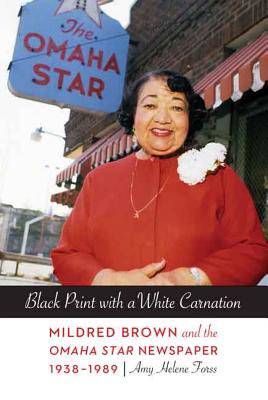
- Retrait gratuit dans votre magasin Club
- 7.000.000 titres dans notre catalogue
- Payer en toute sécurité
- Toujours un magasin près de chez vous
- Retrait gratuit dans votre magasin Club
- 7.000.0000 titres dans notre catalogue
- Payer en toute sécurité
- Toujours un magasin près de chez vous
Black Print with a White Carnation
Mildred Brown and the Omaha Star Newspaper, 1938-1989
Amy Helene ForssDescription
Mildred Dee Brown (1905-89) was the cofounder of Nebraska's Omaha Star, the longest running black newspaper founded by an African American woman in the United States. Known for her trademark white carnation corsage, Brown was the matriarch of Omaha's Near North Side--a historically black part of town--and an iconic city leader. Her remarkable life, a product of the Reconstruction era and Jim Crow, reflects a larger American history that includes the Great Migration, the Red Scare of the post-World War era, civil rights and black power movements, desegregation, and urban renewal.
Within the context of African American and women's history studies, Amy Helene Forss's Black Print with a White Carnation examines the impact of the black press through the narrative of Brown's life and work. Forss draws on more than 150 oral histories, numerous black newspapers, and government documents to illuminate African American history during the political and social upheaval of the twentieth century. During Brown's fifty-one-year tenure, the Omaha Star became a channel of communication between black and white residents of the city, as well as an arena for positive weekly news in the black community. Brown and her newspaper led successful challenges to racial discrimination, unfair employment practices, restrictive housing covenants, and a segregated public school system, placing the woman with the white carnation at the center of America's changing racial landscape.
Spécifications
Parties prenantes
- Auteur(s) :
- Editeur:
Contenu
- Nombre de pages :
- 270
- Langue:
- Anglais
- Collection :
Caractéristiques
- EAN:
- 9780803246904
- Date de parution :
- 01-01-14
- Format:
- Livre broché
- Format numérique:
- Trade paperback (VS)
- Dimensions :
- 152 mm x 226 mm
- Poids :
- 385 g

Les avis
Nous publions uniquement les avis qui respectent les conditions requises. Consultez nos conditions pour les avis.






